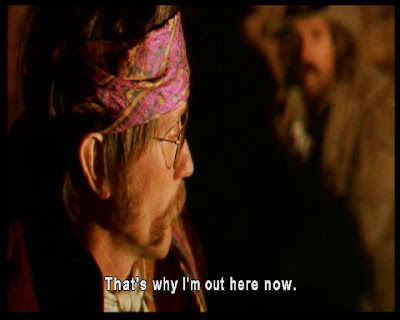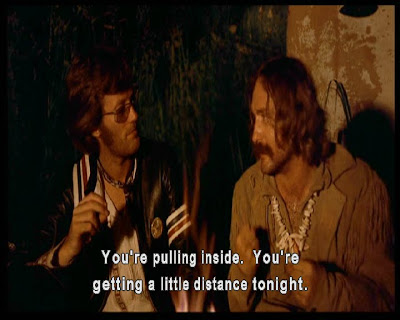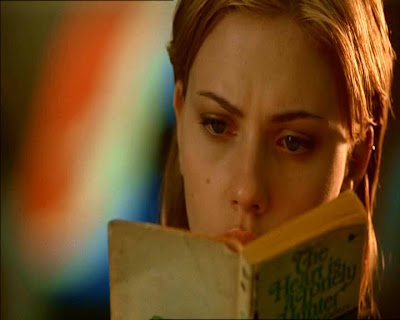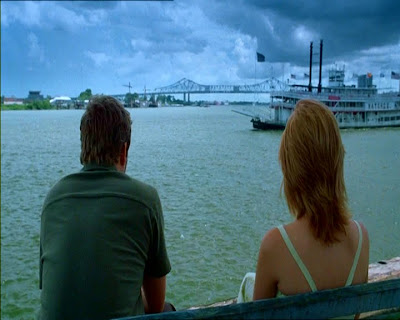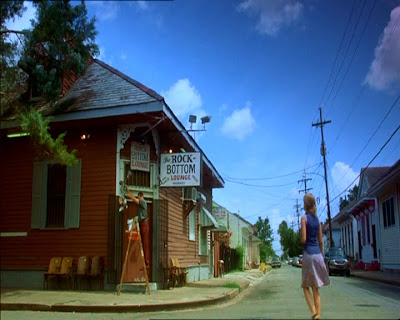
Review intended for those who have already watched the film, spoilers may occur.
A French film directed by Polish director Kieslowski, possibly one of the trickiest of his films to understand I think.
The story is about two identical looking women called Weronika and Veronique. Weronika lives in Poland. Veronique lives in France. They are both played by Irene Jacob, and both have talent as a singer. A tour bus from France travels through Krakow, and Weronika spots Veronique, who is her doppelganger, Weronika smiles, and it seems evident in her curious gaze she would like to speak to her, if she had not seen her, would both women's lives have been different you wonder. The comparisons between the two women in appearance and spirit being just a series of amazing coincidences is one interpretation.
The first third of the film takes place in Poland, the remaining 2/3 in France. The mistakes the Polish girl makes, the French Veronique senses intuitively, the same story is changing or being revised. They become one person on a spiritual level, Veronique has learned from Weronika's mistakes, even though they have never spoken to each other. Two souls, but the same thoughts, what is strange is that distance is the key to the unification. They are far away, but spiritually very close. Perhaps Kieslowski is saying we as humans are all one big family and not so different on the inside, no matter if you are Polish, French, or whatever. Or a message could be that you should listen to what your body is telling you in the case of Weronika, and not push yourself too hard.

There is a certain mystery whether a double exists. If we look long enough would we find that double? And even if we found such a person, would we even want to spend time with them or would it be too awkward? Is it comforting to know that another people in the world might have the same thoughts, ambitions and appearance, so we are not alone, or do we prefer to imagine that we are completely unique? These are interesting philosophical questions that Kieslowski’s film got me thinking about, in fact while writing this very review.
Talking of doppelgangers, I think its not just a physical double the story is hinting at, but that mental inner doubles are out there, who feel or think like we do. I personally would much rather meet the later ( :
For James at
cinemasights, one interpretation of the film is that the two women are in fact the same woman who exist in two parallel universes. As the train rolls through the city we see the exterior world through the small ball, which flips the image upside down. This creates the idea of a universe running parallel to the one we are observing. The reflection of her in the window also indicates a double.


The Double Life Of Veronique was about something that usually you can't film - intuitions, perceptions, all this inner landscape of sensation, Irene Jacob recalls (...) these little things which in the end, are the main driving force behind what we do, what we end up doing. They are not easy to portray or film. Irene Jacob talks about in an interview: We talk about things we have done. But really, daily life is just as full of feelings, of premonitions... of solitude sometimes... of intense moments of completeness. You can feel very complete, but then sometimes, feel empty, hollow. And suddenly feel very receptive to all that happens each day, to all the little things that happen outside ourselves, ultimately. But Kieslowski, she says, refused to discuss the underlying themes of the film with her. That would have meant speaking about metaphysics and chance and doubles. He told me that because the film could be taken on such a poetic level we had to be very concrete. For him, metaphysics and chance was something always there in banal, everyday life - a piece of light, the rain, she recalls. His theory was that if you said to people that you already knew what the film was about, nobody would offer any suggestions.
It was no accident that Kieslowski's late features, from The Double Life Of Veronique onward, have women as protagonists. As he told the author Danusia Stok: "Women feel things more acutely, have more presentiments, greater sensitivity, greater intuition... The Double Life Of Veronique couldn't have been made about a man.” Kieslowski attempts to show the world from a woman’s viewpoint.
Must be tough to be the boyfriend of Weronika or Veronique, they both feel a connection to another person, and not so much the lover. Alexandre, Veronique’s lover, is held at a distance, like in any relationship between people we can never get inside each others head. He tries to reach her and makes her into a piece of art by portraying her in his new puppet story. There is a dream of wanting to be joined spiritually, which perhaps lifts the body and soul above the earthly circumstance, is this achieveable in fleeting moments through art or other situations? Alexandre wants to know her, and Veronique already has it to a certain extent, but doesn't fully understand the connection with Weronika, and nither do we the audience comprehend this. Alexandre is also an ambiguous character, does he really want a relationship with Veronique, or is she merely a jigsaw piece in his current artistic venture?

Roger Ebert thinks it’s a puzzle not to be solved, instead a poetic overture on the power of senses and sensibilities, about seeing oneself at a distance.
A very interesting idea I think to perceive yourself from a distance, something we do when we hear our own voice recorded and don’t recognize it, or see ourselves on film when others have videotaped our body language. Can be an eye-opening or surprising experience. We have an inner perception of how we are perceived, which may or may not match how others perceive us. If there is a mismatch of the inner and outer we can feel misunderstood. Being able to see yourself from a distance, or asking others how you appear, can help in making people comfortable around you, because then you sense for example how you behave in a group situation. Would we change anything in our lives, if we watched a big brother film of a day in the life of X? I don’t know. Depends on if we are happy with our lives, or want a change. Perceiving yourself in such a way sounds very narcissistic, so perhaps it’s good we can’t watch ourselves! There will never be a common perception of any given person anyway, everyone will have a subjective opinion about someone, which is constantly evolving, depending on many factors, how well they know him or her, and if they can relate, etc.

Veronique senses there is another individual like herself, and she intuitively decides to act differently than Weronika did, and stop singing. If we see a friend or a movie character in a difficult spot, in many cases its easier to give advice and suggest a change, than it is to alter our own life. It’s interesting to contemplate if some people imagine a fictitious “other self” to try and see how they might conceivably act in certain situations. A dress rehearsal to real life without risk. Weronika is such a person I think for Veronique, a similar person she can project her own feeling onto, who may or may not really exist, and on an internal level mirror herself in, an avatar? If Veronique did continue singing, then the worst-case scenario is what happened to Weronika. Sort of imagining or predicting certain situations in your head is very difficult to do, but in the case of Veronique she knows herself so well that she can foresee a problem, a very unique talent or whatever you want to call her gift. I think the smartest people can foresee many steps ahead, and avoid disappointment in that way. If you know what you are capable of, then you avoid what you can't do I guess. Then again, if you shy away from pushing yourself to the limit, life may become boring, if you don't challenge yourself enough.
 From interview book Kieslowski on Kieslowski: “You can describe something that maybe doesn’t happen on screen, but which by virtue of the music exists. It’s interesting to bring something to life, which is not in the actual film or the actual music. By combining film and music, a certain atmosphere arises.”
From interview book Kieslowski on Kieslowski: “You can describe something that maybe doesn’t happen on screen, but which by virtue of the music exists. It’s interesting to bring something to life, which is not in the actual film or the actual music. By combining film and music, a certain atmosphere arises.”
“Restriction, necessary restrictions and necessary compromise, evokes a certain imagination and agility and inspires an energy, which puts you in a position to invent original solutions and ideas for the script”
“when your heart stops, the bar on the machine is completely horizontal. And one time Veronique holds her shoelace tightly and realizes what this means”
“Veronique is constantly having to decide, if she should follow the path of the Polish Weronika or not; if she should give in to her artistic instinct and the excitement, the art contains, or if she should give in to love and all that it entails.”
“I imagine that Veronique doesn’t spend the rest of her life with Alexandre. You see her cry near the end. She cries, when he reads to her, and the glance towards him does not suggest love, because in reality he has used her. He has used her for his own personal gain. I think she is a lot wiser at the end of the film, than at the beginning. Alexandre makes her aware that there is something more, that the other Weronika really existed. It’s him, who discovers the photo. Veronique hadn’t even noticed it among the dozens she had. The photo caught his eye, and maybe he understood what she could not comprehend. He understands and uses the photo. The moment he uses it, she understands, that he probably was not the man she desperately had been waiting for, because in the same instance this was revealed, something of hers, which was terribly intimate, as long as it wasn’t spoken of, was used. And when it had been used, it was no longer hers; and when it was no longer hers, there was nothing mysterious about it. It was not something personal anymore. It had become a public secret.”
Superstition, prophecy, premonition, intuition, dreaming – all this constitutes a human beings inner life; and all of this area is the most difficult thing to capture on film. Even though I know it can’t be captured, how ever hard I try, then I still work in that direction to get as close to it, as my ability allows me to.”
“If film really aims to achieve something – this is how I see it anyway – it is for a person to find themselves in the material.”
“There’s a great story I was told by an American journalist. He read a novel by Cortazar about a main character, who’s name, surname and life was identical to the journalist’s. If this was a coincidence or not the journalist couldn’t say, so he wrote to Cortazar and told him, that he had read the book, and suddenly discovered, that he was reading a book about himself. (…) The journalist told me about the reply, where Cortazar was excited about, what had happened, he had never met the journalist, never seen him, never heard of him. And he was overjoyed by having created a character, who existed in real life. It was in connection with Veronika, that the American journalist told me about this.” (translated)
Cinematographer Slawomir Idziak was interviewed:
The Double Life Of Veronique started with a very funny story. I was shooting a film in Berlin when Krzysztof called me one day. He wanted to meet, so we met in Berlin. He told me the following story, ‘I'd like to make a film about a phenomenon I read about recently in the paper. When they come up with a kind of rat poison in the US, European rats know about it the very next day, though they have no way of knowing about it that quickly. It's an odd phenomenon and I'd like to make a movie about it.’
In the particular case of The Double Life Of Veronique, the most important thing was Krzysztof's assertion, based on his declaration that he wasn't interested in the obvious differences between the two countries, what's used in every film in the so-called ‘West’. All this he deemed to be irrelevant. He was interested in a central character who, regardless of place, regime or politics, is a person with all the same problems. He wanted these two worlds to be identical, to be the same.
Veronique is an example of a film where a director expected his artistic partner, his cinematographer, to suggest a look for the film. The work on the set always started with his rehearsals after which he would ask me how I'd like to film it. Sometimes, of course, he could see a scene differently and disagree with me and, naturally, his decisions were final. But, as a rule, the cinematographer suggested how a scene should look. The film ended up having a green/yellow colour.

Both the use of colour, and daily activities of a sensitive twentysomething female French girl may have influenced Jean-Pierre Jeunet's Amelie (2001).
Spoiler: David Lynch’s Mulholland Drive could also be compared, in that Weronika could be Veronique's dream, a dream which Veronique learns a lot from. Could the title The Double Life Of Veronique be hinting it is Veronique's dream?
Much like the Three Colours Trilogy, classical music plays an important atmospheric role, so lovers of that type of music are in for a treat. The scene of an old person struggling along and being watched is also similar in The Double Life Of Veronique and the Three Colours Trilogy, and connects the theme of the films. The dual role of Weronika and Veronique gave Irene Jacob a Best Actress award in Cannes.
I love the visual imagination and attention to detail, and certainly a very interesting film to interpret. Notice I call it a film, not a movie. And to me holds up to quite a few viewings, which is obviously a sign of a film of high quality.
Readers, I'd love to hear any comments on The Double Life Of Veronique!
IMDB
Rottentomatoes
interview transcripts:
Kieslowski’s world and book Kieslowski on Kieslowski











